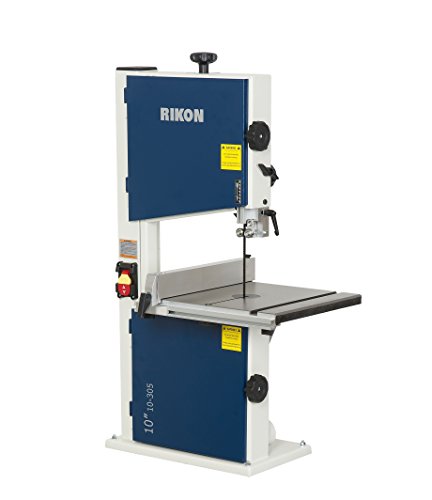In this comprehensive band saw vs table saw comparison article, we will try to address some of the following questions:
What is the distinction between the two? What is it that one can do that the other cannot? Is it necessary to have both? Which one is the more expensive tool?
We’ll also take a peek at some of our favorite models and brands for each saw near the end of the guide.






Band Saw vs Table Saw: Overview
The table saw and the band saw are two very different, but equally useful, tools found in most DIY shops and garages around the world.
In general, the table saw is the more popular, well-rounded, and versatile of the two saws. It is the normal, go-to woodworking saw (besides the circular saw).
If you’re getting started in setting up a workshop or garage, the table saw must likely be your first investment. The rest of the space can be set up around it.
However, the band saw has its own set of functions and applications, and it deserves a place in any woodworking space.
Table Saw
If you’re new to golf, you’ll need to purchase a golf club. And if you’re new to badminton, you’ll need to purchase a racket. Similarly, if you’re new to woodworking, you’ll need to invest in a table saw.
It is, as previously said, the traditional woodworking equipment.
Circular saws, routers, and miter saws can all basically perform the same tasks as a table saw. But none of them can do so with the same ease, reliability, and precision as the table saw.
For complete beginners, all it takes is a decent table saw and a couple of hours spent reading the user manual to produce a budding carpenter.
Table saws can produce precision squares, miters, rips, bevels, grooves, and more with their adjustable blade width, various blade sizes, and a sound fence system. These types of cuts are really most of what you’ll come across in a basic carpentry journey.
Best Table Saws
Band Saw
As previously stated, while we would never suggest buying a band saw instead of a table saw, they can definitely do certain types of jobs that a table saw would be unable to do.
A band saw can do scroll cuts (curves) and work with dense material (3 1/2” thickness or more). These are both not possible with a table saw.
Band saws can be used to make straight, long cuts (squares, rips, etc.) on regular chunks of material like 2x4s. However, a table saw is a much more practical and effective option for these types of cuts due to its light, thin blade.
Best Band Saws
Band Saw vs Table Saw: Uses
- Dados, grooves, insets, and so on: The table saw is the only possibility when you need to cut part of the way through the material (i.e. considering band saw vs table saw).
- Squares and rips: If you’re splitting lumber to length and need very straight, rips (long cuts), a table saw is the preferred choice. This is also the case if you are planning to crosscut and require perfect squares.
- Curves, scrolls, and other odd shapes: The band saw is obviously your best option here.
- Bevels and miters: These forms of angled cuts can be made with either a table or a band saw. But it’ll be much smoother with a table saw because you can simply change the blade rather than the angle of the working material.
Other Factors To Consider
Before we conclude the band saw vs table saw discussion, there are a few more things to think about so that you can figure out which one you need.
Types Of Material
Different blades can be used with table saws to cut metal, plastic, cement board, and other materials. But band saws are most widely used to cut metals and other materials because the teeth on the blades are lighter and closer together.
Safety
To begin with, there is no such thing as a safe saw. We’re referring to razor-sharp blades moving at really high RPMs, which isn’t exactly safe.
Table saws, in general, are known to be one of the riskier saws available. This is because, unless you’re working with a push tool (which is always recommended), your fingers and hands are in close proximity to the blade.
Table saws are also much more likely to scatter materials around your garage at extremely high speeds.
Kerf
The term “kerf” refers to the amount of material the saw blade actually removes. Band saws have much thinner blades than table saws, resulting in a smaller kerf and less material removal.
This is one of the reasons why timber mills use giant band saws to raw-rip entire tree trunks – a lower amount of material gets wasted.
Material Thickness
Band saws, as previously said, are the better option for cutting through very thick materials. Regular table saw blade heights are about 3 1/2”, but anything thicker than that would need a band saw.
Conclusion
If you’re starting a woodworking garage and can’t decide between a band saw vs table saw, for all intents and purposes, go for the table saw.
That’s not to suggest that band saws are bad, ineffective, or inferior to table saws. They’re just more of a specialized saw. You’ll find fewer situations and projects where you’ll need the band saw compared to the table saw.
